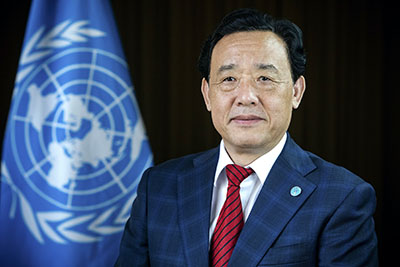QU Dongyu, Director-General of Food and Agricultural Organization
The United Nations Group on Information Society (UNGIS) dialogue takes place at a time when the COVID-19 pandemic is pushing an additional 70-100 million people into extreme poverty according to the World Bank. To date, almost 690 million people are suffering from hunger.
The pandemic has placed a strain on the world’s food systems with a greater impact on developing countries. Meanwhile, the year 2020, has been recognized by the UN Secretary-General, as the beginning of the ‘Decade of Action’ towards expediting the delivery of the Sustainable Development Goals (SDGs).
The COVID-19 pandemic is likely to affect the achievement of the outputs set for the “Decade of Action”, subsequently impacting the attainment of the SDGs by 2030. FAO is working with its Members, UN agencies and other partners to mitigate the effect of COVID-19 on food and agriculture, value chains, food prices and food security across the globe.

The immediate impact of COVID-19 has been on food supply chains, labour shortages, increased challenges for farmers to access local markets and information, logistics challenges and decreasing food imports for import dependent countries. However, as we enter into a new decade, it is abundantly clear that we need to redouble our efforts.
FAO is part of the UNGIS and has been the custodian of the World Summit on the Information Society (WSIS) Action Line on E-Agriculture with the support of the International Telecommunication Union (ITU). Since then, FAO has integrated innovation and digitalization in its approaches in ending hunger and malnutrition.
FAO recognizes that digital technologies are poised to affect the entire global food system and every actor in that system. Digital technologies are also set to bring many opportunities amidst the challenges of poverty and hunger, gender inequality and climate change.
In the Decade of Action, FAO’s goal is to drive sustainable digital solutions and innovation, while making space in the agriculture and food sector for rural communities and empowering the youth.
FAO also wants to ensure that no one is left behind in the digital age. For example, during the current COVID-19 pandemic, FAO has been offering policy support, digital solutions such as big data and crop calendars for its Members to mitigate the effects of the pandemic on food systems.
FAO is also providing a range of tools and knowledge, which governments are using to fight the desert locust outbreak. These tools range from data collection that monitor the presence of locusts to geospatial systems that help predict where the crop-hungry pests will travel to next.
Therefore, in this UNGIS dialogue, FAO will report on some activities and on a number of digital agriculture solutions developed to support Members in different aspects of value chains; brief on policy support regarding the implementation of digital agriculture strategies; highlight some digital solutions developed; and report on the digital capacity development of stakeholders in Member countries.
The presentation will highlight the recent organization changes that are likely to promote digitalization in the agriculture and food sectors in the future.



